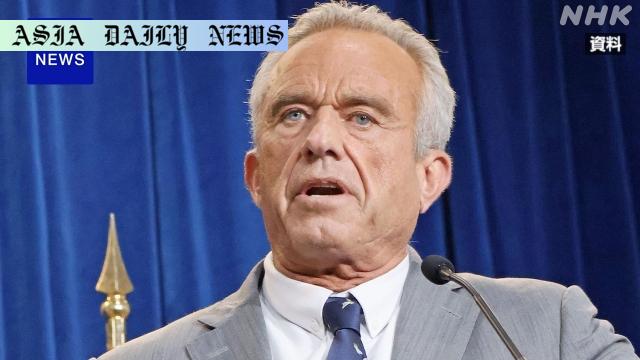Vaccine Advisory Committee, HHS Secretary Robert F. Kennedy Jr. fires all 17 members of CDC’s vaccine advisory committee.

Introduction: A Controversial Reset
The recent decision by U.S. Health Secretary Robert F. Kennedy Jr. to terminate all 17 members of the Advisory Committee for Immunization Practices (ACIP), a key panel advising the Centers for Disease Control and Prevention (CDC), has sparked widespread reactions. Charged with recommending vaccine protocols, this panel’s removal comes under the premise of restoring public trust in vaccine science. While supporters argue it’s a move toward greater accountability, critics warn of potential risks to public health due to the abrupt dismissal of seasoned experts.
The Role and Importance of ACIP
ACIP serves as a cornerstone of vaccine policy in the United States. Composed of leading doctors, scientists, and researchers, the committee assesses scientific data to recommend vaccines for public health programs. They were instrumental in steering COVID-19 vaccine recommendations. Their guidance is reviewed by the CDC before final recommendations, impacting policies on diseases ranging from influenza to childhood immunizations. By ensuring data-driven decisions, ACIP helps establish confidence and adherence to vaccination programs nationwide. The nature and timing of their dismissal, however, have raised significant questions about the future of vaccine policies in the U.S.
Why the ‘Clean Sweep’?
In his statement, Health Secretary Kennedy declared that replacing the ACIP members was crucial to reinstating public faith in vaccine science. This decision aligns with ongoing skepticism and misinformation surrounding COVID-19 vaccines, especially during and after the pandemic. According to Kennedy, the prior structure of the panel lacked the trust necessary for the administration to confidently promote public health agendas.
The move, however, has faced substantial criticism. The Infectious Diseases Society of America (IDSA) denounced the decision, calling it “unfounded” and cautioning that it would erode confidence in vaccines and undermine the science-based decision-making process. The sudden removal of experienced experts without a clear succession plan or transparency in forming a new panel is considered by many to be a risky decision, especially during a time when vaccine hesitancy remains a challenge for public health initiatives.
The Opposition’s Concerns
Critics, including respected scientific organizations like the IDSA, warn that this decision undermines scientific legitimacy. The removal of seasoned professionals jeopardizes the historical balance of expertise and unbiased oversight ACIP had maintained for decades. By disrupting this structure without a transparent plan for replacing these critical members, Kennedy’s actions risk increasing public distrust instead of mitigating it. Additionally, the timing of the decision raises questions about its underlying objectives, as it coincides with broader debates about vaccine science, government authority, and public health responsibility.
Future Implications for Public Health
The dismissal could have far-reaching effects on the American public health landscape. Vaccination programs, especially childhood immunizations and responses to emerging health crises, rely heavily on ACIP’s collective expertise. The absence of an established panel leaves a gap in informed guidance, placing an additional burden on the CDC and causing potential disruptions to vaccination schedules. Moreover, the uncertainty surrounding new appointments to the panel adds to the complexity of safeguarding public health during transitional periods.
Experts are calling for clearer communication and greater transparency on the criteria for selection of new members. It remains uncertain how the government will reconstitute the panel and whether they will maintain the scientific rigor and independence essential to earn public trust.
Conclusion: Balancing Trust and Science
While the intention to restore public confidence is commendable, the decision to fire all ACIP members en masse may inadvertently weaken the very foundation of trust it seeks to rebuild. A balanced approach that preserves the depth of expertise while addressing concerns about transparency and accountability would likely have safeguarded public health more effectively. Moving forward, collaborations between new experts, public health organizations, and the government will be pivotal in rekindling trust.
Commentary
Introduction: A Bold but Contentious Decision
The removal of all 17 members of the CDC’s vaccine advisory panel will undoubtedly go down as a controversial moment in U.S. public health history. The decision speaks volumes about the current divide in public trust and the challenges in reconciling science with public perception. But was it the right move?
The Need for Accountability
Public trust in vaccines has been strained over the years, with misinformation and politicization taking a significant toll. Secretary Kennedy’s call for accountability and fresh oversight has its merits. Creating a structure in which the public feels that scientific decisions are unbiased and free from external pressures is an admirable goal. However, such changes should be undertaken thoughtfully, maintaining continuity and ensuring the retention of valuable expertise rather than embracing a scorched-earth policy.
The Risks of Abrupt Change
On the flip side, the sudden dismissal of seasoned professionals is concerning. The depth of knowledge and historical perspective lost with a complete panel overhaul cannot be understated. Experts like those in ACIP are not easily replaced, and their absence at such a critical juncture could weaken public health strategy. Given the reliance on this committee for vaccine rules and recommendations, the decision might create more problems than it solves, creating an avoidable gap in U.S. health policy leadership.
Balancing Reform and Expertise
The path to rebuilding trust lies in a balanced approach. Reforming systems without forsaking the expertise that makes them effective is key. Transparency in both the decision-making process and governance of public health institutions will be critical in ensuring that any new panel adequately balances scientific credibility with the need for restoration of public confidence. Hasty decisions risk alienating not only the public but also the professional bodies that play a pivotal role in maintaining strong, evidence-based health policies.


